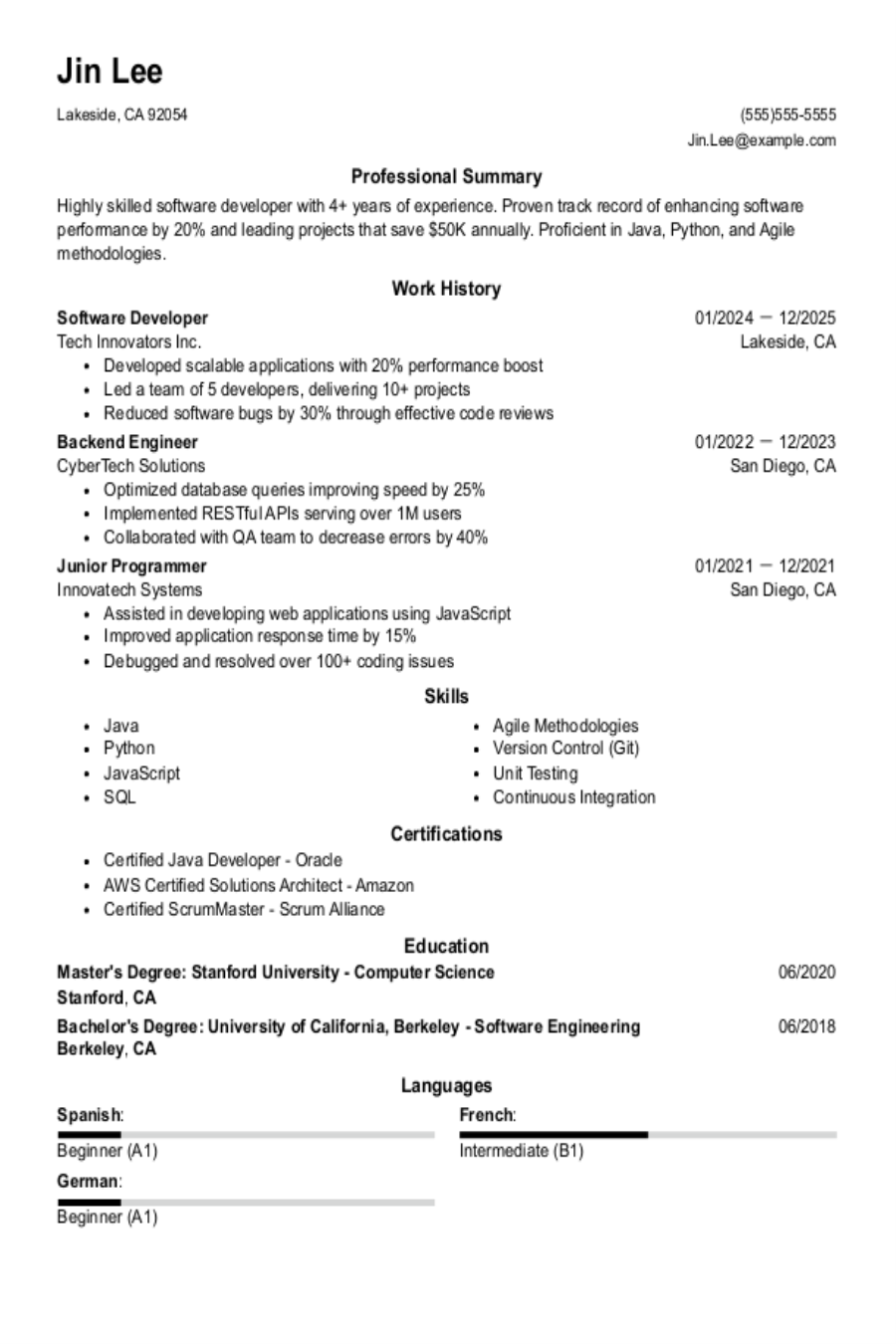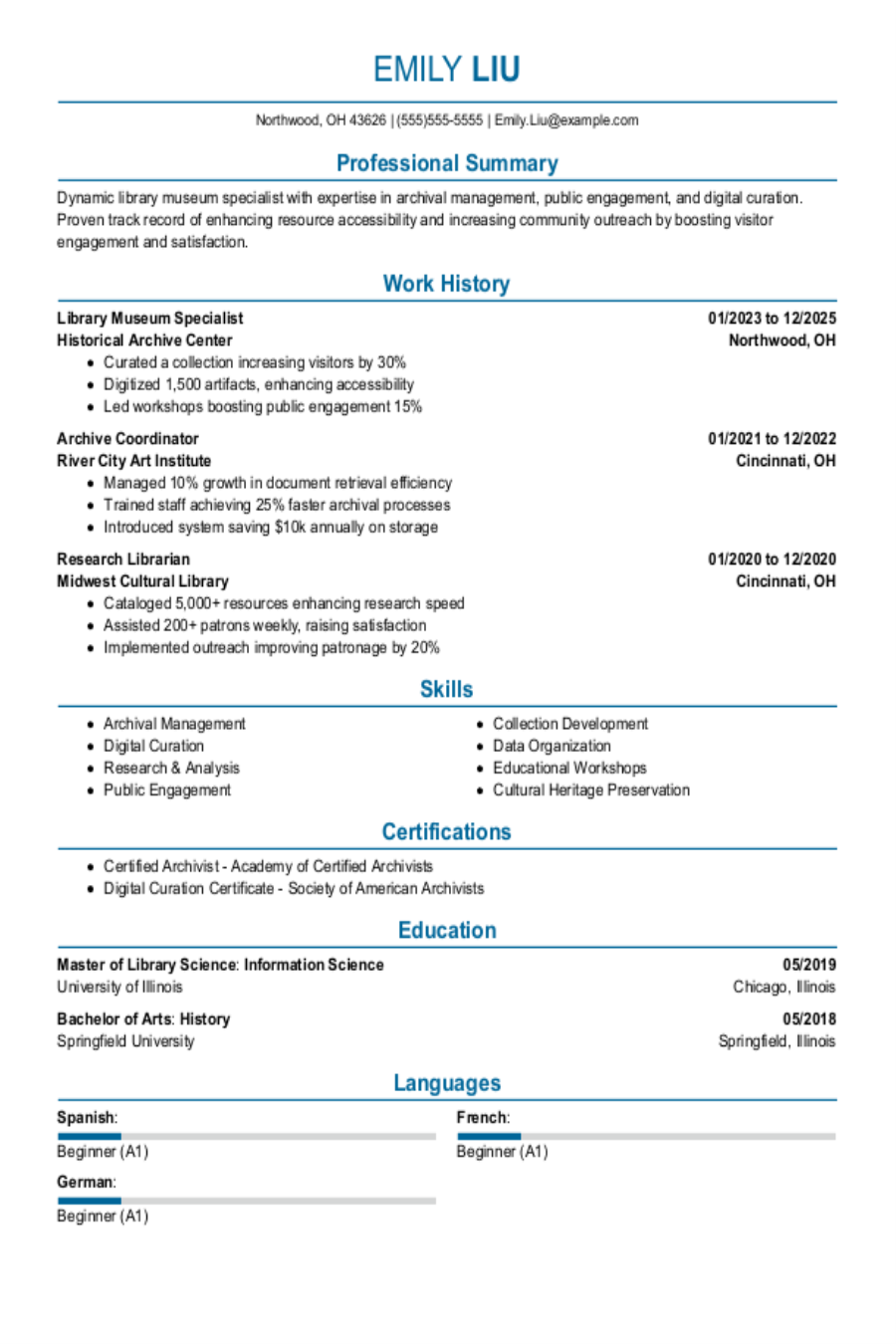Table of contents
Popular Biomedical Engineer Resume Examples
Entry-level biomedical engineer resume
An entry-level resume for a biomedical engineer should emphasize relevant projects, internships, technical skills, and educational achievements to showcase potential and readiness for the role despite limited experience.
Places skills over experience: The functional resume format is helpful for entry-level biomedical engineers as it highlights key skills like medical device development and project management, showcasing relevant expertise over limited experience.
Prioritizes readability: Opting for a simple resume template allows this biomedical engineer to present their accomplishments clearly, enabling recruiters to quickly grasp their expertise and contributions in the field.
Mid-career biomedical engineer resume
A mid-career biomedical engineer resume should emphasize a strategic mix of hands-on project experience, technical skills, and evidence of continuous learning and innovation in the field.
Includes mix of skills: This profile effectively illustrates a harmonious mix of technical prowess and interpersonal skills, highlighting the job seeker’s capability in both engineering solutions and team collaboration.
Encourages quick scanning: A clean layout and structured format facilitate quick navigation through the applicant's extensive qualifications, showcasing their relevant experience and skills at a glance.
Experienced biomedical engineer resume
An experienced biomedical engineer resume should highlight key projects, technical skills, and relevant achievements to effectively demonstrate the job seeker's expertise and professional growth in the field.
Highlights experience: The resume's opening summary effectively showcases the applicant's 11 years of experience in biomedical engineering. It establishes a professional tone by emphasizing their accomplishments in medical technology, device efficiency, and leadership in R&D projects.
Optimized for ATS: The resume uses a structured layout that features a professional header and an ATS-friendly resume design, which makes it suitable for both human review and automated screening processes.
No experience biomedical engineer resume
A resume for an applicant with no experience in biomedical engineering should emphasize relevant coursework, technical skills, and any hands-on projects to showcase their potential and dedication to the field.
Favors clarity over complexity: The resume's clean design highlights academic achievements and volunteer experiences, emphasizing strong skills and a proactive approach to biomedical engineering.
Leads with education: Including relevant coursework in biomedical engineering, such as tissue engineering and medical robotics, demonstrates a solid foundation of specialized knowledge that improves the applicant's qualifications despite limited professional experience.
More resume examples
Additional Guides
Biomedical Engineer Resume Template
Looking for a great way to showcase your skills? This biomedical engineer resume template serves as an excellent starting point—just personalize it with your details and stand out.
Suki Garcia
Cincinnati, OH 45204
(555)555-5555
Suki.Garcia@example.com
Professional Summary
Biomedical Engineer with 5 years of experience. Proven expertise in device development, clinical trials, and efficient project management. Strong skills in data analysis and team leadership.
Work History
Biomedical Engineer
Innovative Health Systems - Cincinnati, OH
January 2023 - October 2025
- Developed lifesaving devices, reducing failure rate by 15%
- Led a team of 5 engineers on biocompatibility testing
- Implemented new protocols, increasing efficiency by 20%
Clinical Research Engineer
Precision Medical Research - Cincinnati, OH
January 2020 - December 2022
- Managed data analysis for clinical trials, improving accuracy by 25%
- Coordinated with cross-functional teams to streamline research
- Conducted quantitative analysis, enhancing study outputs by 30%
Biomedical Equipment Technician
MedTech Solutions - Cleveland, OH
January 2018 - December 2019
- Maintained medical equipment, reducing downtime by 10%
- Trained staff on new device usage and safety protocols
- Performed equipment audits, ensuring compliance with standards
Education
Master of Science Biomedical Engineering
Stanford University Stanford, California
June 2018
Bachelor of Science Biomedical Engineering
University of California, Berkeley Berkeley, California
June 2016
Skills
- Device Development
- Clinical Trials
- Data Analysis
- Biocompatibility Testing
- Team Leadership
- Efficiency Improvement
- Quantitative Analysis
- Medical Equipment Maintenance
Certifications
- Certified Biomedical Equipment Technician - International Certification Commission
- Regulatory Affairs Certification - Regulatory Affairs Professionals Society
Languages
- Spanish - Beginner (A1)
- German - Beginner (A1)
- Japanese - Intermediate (B1)
Must-Have Skills on a Biomedical Engineer Resume
A strong skills section is an important component of any effective resume.
Technical and engineering professionals develop solutions that support innovation and operational strength. The skills you highlight should reflect your ability to contribute to complex projects and maintain quality standards. Your resume needs to show how you help drive progress and ensure reliable, effective results.
The following insights highlight the most prevalent hard and soft skills for biomedical engineers based on Resume Now’s internal resume data.
When you’re ready to improve your resume with essential skills, check out our AI Resume Skills Generator. It offers tailored suggestions for both hard and soft skills relevant to your job title, enabling you to create a comprehensive and personalized skill set.
Writing Your Biomedical Engineer Resume
Having explored these effective resume examples, you're now prepared to dive into the detailed process of how to write a resume. We will walk you through each section step by step to ensure you create a compelling and professional document.
List your most relevant skills
An effective skills section on your biomedical engineer resume should highlight both technical abilities, such as skill in medical imaging and biostatistics, along with essential soft skills like teamwork and analytical thinking. This balance demonstrates that you’re equipped to tackle the diverse challenges of the role.
To strengthen this section, pay close attention to the keywords from the job listing. Incorporating these terms not only makes your resume more appealing to human recruiters but also improves your chances of passing through applicant tracking systems. By aligning your skills with what employers are seeking, you present yourself as a strong applicant ready to contribute meaningfully to their team.
Example of skills on a biomedical engineer resume
- Proficient in designing and testing medical devices and systems
- Strong analytical skills with a focus on problem-solving
- Collaborative team player with experience in cross-disciplinary projects
- Detail-oriented with excellent project management capabilities
Emphasizing your soft skills on your resume can set you apart from other applicants. Employers appreciate interpersonal abilities since they are difficult to teach and often contribute significantly to a positive workplace culture.
Highlight your work history
Your work experience section is essential to highlight not just your job duties but also your achievements. Focus on specific projects or innovations where you applied your engineering skills effectively, showcasing how you've made a tangible impact in your field.
When detailing each job entry, ensure you include key information such as your title, the employer's name, and the dates of employment. This information helps establish your professional credibility and allows employers to see the timeline of your career.
Example of a biomedical engineer work experience entry
- Biomedical Engineer
MedTech Solutions - San Francisco, CA
June 2018 - Present - Develop and optimize medical devices, leading to a 20% improvement in device performance and patient outcomes
- Collaborate with cross-functional teams to conduct research and testing, ensuring compliance with FDA regulations and industry standards
- Implement advanced prototyping techniques that reduced development time by 15%, accelerating product launch timelines
- Provide technical support and training for healthcare professionals, improving user experience and satisfaction by 30%
- Lead data analysis projects to refine device functionality, resulting in a 10% increase in operational efficiency
Highlighting outcomes and achievements in your experience section is important for capturing employers' attention. By showcasing how you’ve contributed to successful projects or improved processes, you demonstrate your value as a job seeker. This results-oriented approach not only sets you apart but also illustrates your ability to make a meaningful impact in the field of biomedical engineering.
Include your education
The education section of your biomedical engineer resume should be organized in reverse-chronological order, starting with your most recent degree. Include all relevant degrees and certifications while omitting high school diplomas if you hold a higher qualification.
For those currently enrolled in an academic program or with incomplete education, it is essential to list the highest completed level along with an expected graduation date. You may also want to include bullet points that highlight key coursework or academic accomplishments related directly to biomedical engineering.
Common certifications for a biomedical engineer resume
- Certified Biomedical Engineer (CBE) – American Institute for Medical and Biological Engineering (AIMBE)
- Professional Engineer (PE) – National Council of Examiners for Engineering and Surveying (NCEES)
- Clinical Engineer Certification (CCE) – Healthcare Technology Certification Commission (HTCC)
- Biomedical Equipment Technician Certification (CBET) – Association for the Advancement of Medical Instrumentation (AAMI)
Sum up your resume with an introduction
Creating a strong profile section in your resume is essential—it’s your chance to make a lasting first impression on potential employers. This section serves as a snapshot of your professional summary, encapsulating your experience and skills while setting the tone for the rest of your resume.
If you have significant experience in biomedical engineering, consider using a professional summary. This approach allows you to highlight key accomplishments and technical expertise right at the top, making it easier for hiring managers to quickly gauge your qualifications and what you bring to the table. If you lack extensive work history, try a resume objective that reflects your goals and enthusiasm for development.
Professional summary example
Innovative biomedical engineer with over 5 years of experience in advancing medical device technology. Demonstrated success in designing and optimizing systems that improve patient outcomes, while ensuring regulatory compliance and safety standards. Proficient in 3D modeling, prototyping, and conducting rigorous testing to deliver high-quality solutions for healthcare challenges.
Resume objective example
Enthusiastic biomedical engineer eager to apply innovative problem-solving skills and technical knowledge in a collaborative healthcare environment. Committed to using strong analytical abilities and attention to detail to improve medical device development and improve patient care outcomes.
Your resume profile should always begin with your job title, whether you choose a professional summary or an objective statement. This approach instantly communicates your professional identity to employers, allowing them to understand who you are and what you do right from the start.
Add unique sections to set you apart
Improve your resume by adding optional sections that highlight your unique qualifications as a biomedical engineer. These sections allow you to present a well-rounded picture of yourself to potential employers.
By including relevant hobbies or volunteer experiences, you can demonstrate not just your technical skills but also the personal values that drive your work ethic. Whether it's participating in health-related initiatives or engaging in projects that improve community wellness, showcasing these aspects helps employers see how you apply your engineering skills beyond the workplace.
Three sections perfect for a biomedical engineer resume
- Technical Skills: Technical skills are essential on your resume as they demonstrate your expertise and ability to tackle specific challenges in biomedical engineering. Clearly showcasing these skills can set you apart from other applicants and attract potential employers.
- Tools and Platforms: In biomedical engineering, computer skills in software and tools are essential. Highlight your abilities in simulation software, data analysis platforms, and medical imaging systems to showcase your technical expertise and adaptability.
- Professional Certifications: Certifications showcase your dedication to professional growth in technical fields. Highlight relevant certifications from recognized organizations, along with their completion dates, to improve your career prospects.
5 Resume Formatting Tips
- Choose a format that matches your career stage.
Choosing the right resume format is important for showcasing your skills effectively. If you have extensive experience, a chronological format highlights your career progression. For those just starting, consider a functional resume to emphasize relevant skills. A combination format can also work well if you want to highlight both your experience and capabilities.
- Pick a smart resume template.
Using a professional resume template improves readability and formatting, allowing your qualifications to stand out clearly. If you opt for a custom format, keep it straightforward and choose fonts that are easy to read and ATS-compatible. This approach will help ensure your resume catches the attention of hiring managers.
- Select an appropriate font.
Choose a clean, professional font to improve your resume's readability. Fonts such as Helvetica, Georgia, or Verdana are excellent options that ensure clarity for both ATS and hiring managers.
- Use consistent formatting.
Align your resume to the left and maintain uniform margins. This approach ensures a polished and professional look, making it easier for employers to read.
- Keep your resume to one or two pages.
When crafting your resume, it's important to remember that resumes should be one page long unless you have extensive experience. Focus on keeping your content concise while emphasizing the key details that showcase your skills and achievements.
What’s the Average Biomedical Engineer Salary?
Biomedical engineer salaries vary based on location, career level, and qualifications.
This data, provided by the Bureau of Labor Statistics, will show you expected salary ranges for biomedical engineers in the top 5 highest-paying states, including the District of Columbia. The figures reflect the most current salary data available, collected in 2024.
- Full Range
- Most Common (25th–75th percentile)
- Average
Oklahoma
Most common: $79,120 - $172,910
Rhode Island
Most common: $80,810 - $187,930
New Mexico
Most common: $83,820 - $184,000
California
Most common: $100,490 - $150,160
Oregon
Most common: $104,710 - $136,740
Tools for Your Job Search
Are you gearing up to apply for that exciting biomedical engineer position? Before you hit send on your application, take advantage of our ATS Resume Checker. This essential tool provides insights into how well your resume will perform with the automated systems many companies use for initial screenings, ensuring you meet key criteria.
Want to elevate your resume further? Our AI Resume Builder is here to help! It offers tailored content recommendations specific to your biomedical engineering background and comes with professionally designed templates that effectively showcase your skills and experiences to potential employers.
Frequently Asked Questions
Last Updated: October 9, 2025
Absolutely. A cover letter is important as it adds depth to your resume and creates valuable communication opportunities with employers. It provides a platform for you to express your enthusiasm for the biomedical engineer role and highlight how your skills and experiences align with the job requirements. Don’t overlook this chance—write a cover letter that strengthens your application.
For a quick and effective solution, check out our AI Cover Letter Generator. It allows you to create tailored cover letters in just minutes, with various cover letter template options available that perfectly match your resume, improving the overall presentation of your candidacy.
A CV (curriculum vitae) is generally more extensive and detailed than a resume. Resumes typically span one to two pages and focus on concise summaries of your work history, while CVs can extend several pages, offering in-depth information about your academic qualifications, research contributions, publications, and professional experiences.
For roles in academia or specialized fields like medicine or law, you should use a CV. If you're aiming for such positions, our online CV Maker is an excellent resource to quickly create tailored CVs. Choose from a variety of CV templates designed for different industries and career levels to ensure your qualifications stand out effectively.
To tailor your biomedical engineer resume effectively, focus on the essential skills listed in the job description. Use specific keywords from the posting to highlight how your experience matches the role. This approach not only showcases your qualifications but also helps you stand out to hiring managers.
A strong LinkedIn profile is vital for biomedical engineers seeking new opportunities. It helps you connect with industry professionals and effectively showcase your technical skills and projects.
Biomedical engineers often begin as junior engineers or interns, gaining practical experience. With advanced degrees or specialized training, they can progress to senior engineer roles or management positions in the biomedical field.
Use your cover letter to elaborate on your career goals and how specific roles can aid in achieving them. Target positions that offer growth opportunities to align with your professional development and ambitions.
Was this information helpful? Let us know!
Hailey is a career advice writer dedicated to helping job seekers excel in their careers.
More resources

The AI Boss Effect: 97% of Workers Have Asked ChatGPT for Advice Instead of Their Manager
Resume Now s latest report explores how AI is replacing manage...

37 Unique Skills to Put on Your Resume
Trying to avoid the skills you see pop up on resumes repeatedl...

Resume Now Spotlights 14 High-Innovation, High-Growth Jobs That Pay $60K+
Resume Now s latest report highlights some of the highest payi...




